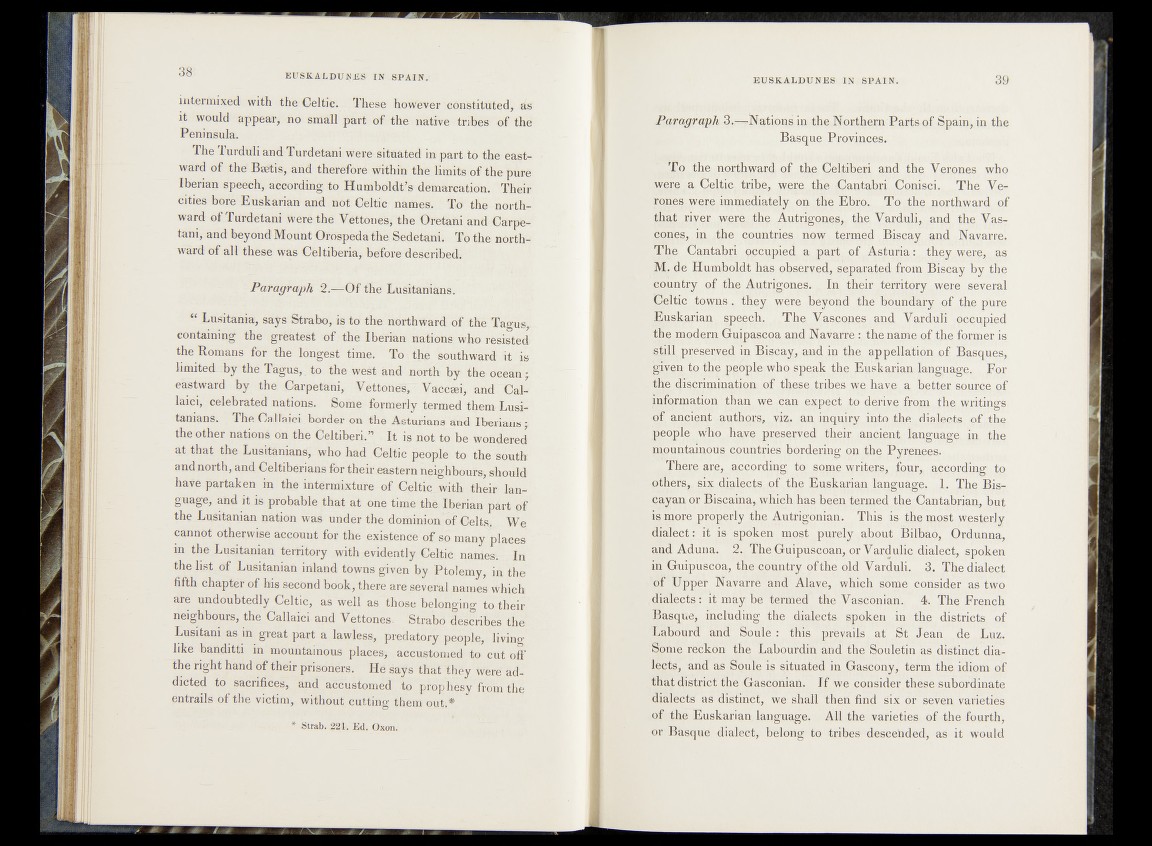
intermixed with the Celtic. These however eômstitttted, as
it would appear, no smàll part of the native tribes of the
Peninsula.
The Turdtdi and Turdetani were situate# in part to the eastward
of the Bsetis, and therefore within the limits of the pure
Iberian speech, according; to Humboldt’s demarcation. Their
cities bore Epskarian and nut Celtic names. To the-north-
ward of Turdetani were the Vëttones, the Oretani and Carpe-
tani, and beyond Mount OrpSpèda15* gëdetani. To the northward
of all these was Celtiberia, before described.
• Paragraph 2| # 0 f the Lusitaniens. ‘
“ Lusitania, says Strabo, is tor the northward of the Tagus>.
containing the greatest of the Iberian nations who' resisted
the Romans for the longest time. To . the southward it is
limited .by the Tagus,, to the west and north by the? ocean j
eastward by the Carpetani, VettoneV^ Yaeeæij and
laici, celebrated nations. Some formerly termed themLusi-’
tanians. The Calfaici border on the Asturians and Ibénans-,
the other nations on the Celtiberi.” 1% ip pot to be wondered
at that the Lusitanians, who had Géltie peoplëi’tqr the 'south
and north, and Celtibérians for their eastern neighbours, should
hate partaken in the intérmixtufe of (^tie^w ith their lam-'
guage, and it is probable that at one time .the Iberian p&rt gf
thç Luiitanian nation was under the dominion of^ Belts, We
cannot otherwise account for the existence o f so many places
in the Lu^tanianTerritory with evidently Geitiè nattes^ In
the list of Lüsitaniap inland towns given by Ptolemy, i& the
fifth chapter of bis second book, there are several names which
are undoubtedly Celtic, arw e ll as those belonging to their
neighbours, the ^Qallaici and Vettones, Strabo describes the
Lusitani as in great part a lawless, predatory people, living
Jlike banditti in mountainous places* accustomed to cut off
the right hand of their prisoners. He says that f héy Wèrd addicted
to sacrifices; and accustomed to prephesyfrphi tïie
entrails o f the victim, without cutting them out.*
Strab. 22 k Ed. Oxon.
Paragraph 3 rNatipps in the Northern Parts of Spain, in the
Basque Provinces.
To tfie northward of the Qeltiberi and the Verones who
■wer e , a Cp|tic? tribe, were^thC .Cantgbri Cpnisci. The Ve-
rones wqrfefimmediately on the Ebro. To the northward of
that river wpre^.thg^Autrigones,, the, Yarduli, and the Vas-
cmes; in .the countries no\y termed Biscay and Navarre,
The ?Cgntabri occupied a part of Asturia: they were, as
M. de Humboldt has observed, separated from Biscay by the
llgMntrv pf the Autrijpnes. In their territory were several
peltic towns,, they Vere fo^ond the boundary of the pure
Euskarian .speech. The (Yaseoueb. a ad Yarduli peeupied
tbA modern Guipascoa and Navarre :4 the name of tjm former is
j p a -preserved in Biscay, and in .mft appellation of Basques,
given to the peonl^wbQ spefak th^Euskariandanguagg^.. For
the dileriminatiom of theseJjrittes we b am 'a,. better source of
reformation „than we ,cap exoe ^ I o derive from the writings
of ancient ^uttmrs, viz, ap, ipquiry into the dialects of the
Jjeople^vfhp JjKerereseE^d .their -apefont.langimge, in the
& ntaiiuius countries bordering op the Pyrgnges.
L^Tb.ere.are, .according to* some wriferA four,, Recording tp
others, si,x; dialectsv of }the Euskari^Afongpage, , 1 . The Biscayan
or Biscaina, y'hich. has bqen termed Jhp^Cantabfian, but
is ipore p r ^ ^ l y the Autrigonian. T h k is ,the most .westerly
dialectis J j is most^.pfirely'. about Bilbao, Prdunna,
and Aduna. 2., The Guipuscoan, or Vardulig dialect, „spoken
in Guipus.com the country of the, old Varduli. 3, The dialect
of'Upper Navarre and Alave, which ’ ‘sortie vcofi^ider as two
dialects: it may be termed * Me Ya^poniiin. 4. The French
Basque, including the dialects spoken in ' the districts, of
Labourd and BouW: th is ^ p r e v a ^ iif St Jeap de Lpz,
Some'reckon the Labourdin and' ttrefSpiiletin as distinct dialects,
and as,Soule is ^ tu a ted 'in ^ a sg p p y , term the idiom of
that district the Gasconian. I f we coniiaer.thesg subordinate
dialects as distinct', we shall then find six or seven varieties;
of the Euskarian. language. All the varieties of the fourth,
or Basqufe'- dialect, belong;- to tribes descended, as it would